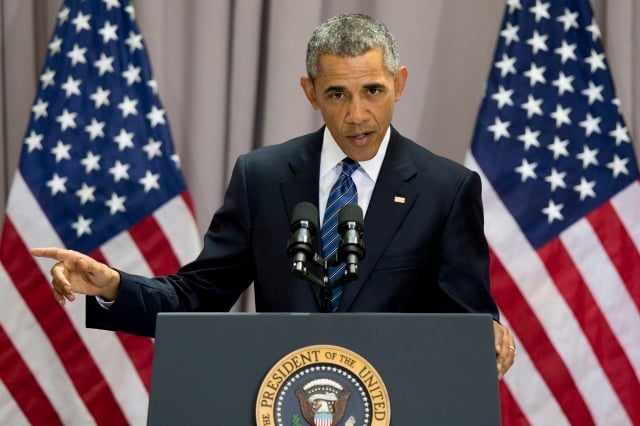
PM Netanyahu. (Marc Israel Sellem/POOL)
“The statement that only Israel opposes the deal is incorrect. Obama knows that also Egypt, Jordan, Saudi Arabia and the Gulf countries oppose the accord, but Israel is the only brave country to do it publicly.” – Tzachi Hanegbi, Chairman of the Knesset Foreign Relations and Security Committee
US President Barack Obama assailed critics of his Iran nuclear deal Wednesday as “selling a fantasy” to the American people, warning Congress that blocking the accord would damage the nation’s credibility and increase the likelihood of more war in the Middle East.
Besides challenging opponents at home, Obama cast Israeli Prime Minister Benjamin Netanyahu as an isolated international opponent of the historic accord, saying, “I do not doubt his sincerity, but I believe he is wrong.”
He said that the entire world has expressed support for the Iran deal “with the exception of the Israeli government.”
The agreement would require Iran to dismantle most of its nuclear program for at least a decade in exchange for billions of dollars in relief from international sanctions. But Netanyahu, the Arab countries in the Gulf and critics in the US argue that it would not stop Iran from building a bomb.
The president’s blunt remarks, in an hour-long address at American University, were part of an intense lobbying campaign by the White House ahead of Congress’ vote next month to either approve or disapprove the international agreement. Opponents of the agreement have streamed to Capitol Hill, too, to make their case, and they have spent tens of millions of dollars on advertisements.
Soviet Threat of 1963 vs. Iran 2015
Obama chose to deliver his Iran speech at American University in an attempt to set it as a sequel to the late President Kennedy’s speech on a Nuclear Test Ban Treaty with the Soviet Union more than 50 years ago at the same venue. Obama apparently hoped to present the deal with the Islamic Republic as resembling the one with the Soviet Union, which was ultimately deemed a success.
However, critics note that there are vast differences between the situation then and now. Iran 2015 is nothing like the Soviet Union 1963, they say.
The stakes are high, Obama said, contending that it isn’t just Iran’s ability to build a bomb that is on the line but also “America’s credibility as the anchor of the international system.”
“The choice we face is ultimately between diplomacy and some form of war,” Obama said. “Maybe not tomorrow, maybe not three months from now, but soon.”
Obama’s diplomatic overtures to Iran, a centerpiece of his foreign policy agenda, have put him at odds with Republicans and some Democrats, as well as with Netanyahu, who has campaigned vigorously against the deal.
Netanyahu and US critics of the Iran deal say Obama is presenting a false choice between accepting the deal at hand and going to war to stop Iran from building a bomb.

MK Tzachi Hanegbi. (Miriam Alster/Flash90)
Speaking to Israel’s IDF Radio on Thursday after Obama’s address, Member of Knesset (MK) Tzachi Hanegbi, Chairman of the Knesset’s Foreign Relations and Security Committee, said that Obama has avoided addressing the critical flaws in the deal that were pointed out by Israel.
He added that Obama’s claim that Israel was the only country to oppose the deal was false. “The statement that only Israel opposes the deal is incorrect. Obama knows that also Egypt, Jordan, Saudi Arabia and the Gulf countries oppose the accord, but Israel is the only brave country to do it publicly.”
Obama told Jewish leaders in a private meeting Tuesday that he understood their concerns about being cast as warmongers. But he made his case even more aggressively Wednesday by linking critics of the deal to those who pushed for the invasion of Iraq in 2003, a conflict now widely considered a mistake.
“I have repeatedly challenged anyone opposed to this deal to put forward a better, plausible alternative,” he said. “I have yet to hear one. What I’ve heard instead are the same types of arguments that we heard in the run-up to the Iraq war.”
Drawing on more distant history, Obama said the Iran deal was in line with America’s long tradition of “strong, principled diplomacy” with adversaries, including the Former Soviet Union.
The Iran accord was finalized last month after more than a year of tense negotiations between Iran, the US, Britain, France, Germany, China and Russia. The president argues that if Congress blocks the accord, the European Union (EU) and the United Nations (UN) will lift their sanctions anyway, collapsing the best leverage the international community has to stop Iran from building a bomb.
Opponents say the deal leaves too much of Iran’s nuclear infrastructure in place and allows Tehran to rebuild its program too quickly. Critics also contend Iran will use an influx of funds now frozen under the sanctions to boost terrorist activity around the Middle East and the globe.
The White House is preparing for the likelihood that lawmakers will vote against the deal next month and is focusing its lobbying efforts on getting enough Democrats to sustain a presidential veto. Only one chamber of Congress is needed to sustain a veto and keep the deal in place.
(Shutterstock)
Obama needs 146 Democrats in the House or 34 in the Senate to sustain a veto. The White House has said it is confident it can sustain a veto at least in the House.
An Israeli official in Jerusalem responded to Obama’s address, saying he did not doubt Obama’s sincerity but disagreed with him.
Obama’s assertion that the rejection of the deal would lead to war is incorrect, he said. “The deal does not prevent war, it causes war, because it gives Iran international legitimacy to build the infrastructure for the manufacturing of a nuclear arsenal.” The released funds would fuel Iran’s terror network, and the removal of the sanctions would enable it to become a world-class power, he warned.
“Obama is right when he says that a nuclear Iran poses a greater threat than an Iran that enjoys the removal of the sanctions. However, the deal enables Iran to develop nuclear weapons and gives it billions of dollars which it will use to enhance it terror,” the official stated.
By: AP and United with Israel
Sign the Petition to Stop a Nuclear Iran
The US Congress must ensure that sanctions against Iran remain in force until the nuclear threat is completely eliminated.
I strongly oppose easing sanctions before the nuclear threat from Iran has been eliminated. Allowing Iran to enrich uranium without being subject to 'anytime, anywhere' inspections is extremely dangerous and unacceptable. Iran's nuclear program must be stopped.
See our Privacy PolicyClick Here to Share the Petition with Your Friends
Click here to locate and contact your Senator.
Click here to locate and contact your Congressman.
Do You Love Israel? Make a Donation - Show Your Support!
Donate to vital charities that help protect Israeli citizens and inspire millions around the world to support Israel too!
Now more than ever, Israel needs your help to fight and win the war -- including on the battlefield of public opinion.
Antisemitism, anti-Israel bias and boycotts are out of control. Israel's enemies are inciting terror and violence against innocent Israelis and Jews around the world. Help us fight back!
